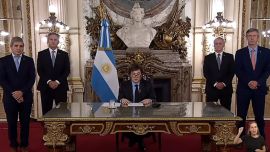As well as trying, so far with little success, to update an antiquated economy, President Mauricio Macri wants to push through reforms in other areas where reaching his goals should be a lot easier. One such has to do with the Armed Forces. Reduced as they have been to something you might find in a historical theme park, they certainly need a shake-up.
After letting go of power well over 30 years ago, the Army, Navy and Air Force were left to rot. Starved of funds, detested by many for what they did in the “dirty war” of the 1970s against homegrown terrorism, for losing against the British in the South Atlantic or for failing to run the economy as they had said they would, it is widely agreed that, in their present shape, they serve no useful purpose (unless providing a handy punching ball for leftists and vengeful populists counts as one).
According to specialists in military matters, they would be hard put to resist for more than a couple of days an invasion by an unfriendly neighbour, such as Uruguay seemed to be a dozen years ago when Néstor Kirchner was getting himself worked up about those allegedly filthy pulp mills he claimed were soiling Argentina’s pristine coasts. Some pessimists have gone so far as to suggest that the Navy’s dilapidated ships would sink, the Air Force’s museum-piece planes would crash to the ground and the Army’s tanks would break down long before they reached any conceivable battle front.
Being a practical man, Macri assumes that, once suitably modernised, the Armed Forces should be given something useful to do. Under current legislation, they must limit themselves to confronting the conventional armies of foreign powers but, as none has shown much interest in trying its luck down here, this means they have been told to just sit down and wait for what hardly anyone thinks could possibly happen.
Macri’s proposals worry many people who, for understandable reasons, want to make sure the military cannot meddle again in the country’s internal affairs, as they openly did time and time again between 1930 and 1983. But these days drawing a line between genuine threats coming from abroad and those that involve the collaboration of people living in the country is not at all easy. As the Europeans have found out, fighting “international terrorism” – by which is meant Islamic Jihadism – entails rooting out local fanatics, many of whom are not attached to organised cells, as well as getting at their comrades in places like Syria, Iraq, Iran, Afghanistan and Pakistan. Much the same can be said about drug-traffickers and cyber-warriors who, like the jihadists, see national borders as lines on maps that are of no interest to them.
Things seemed far simpler half a century ago, when loose talk by Brazilian military strategists about “movable frontiers” and the bellicose nature of men like Chile’s dictator Augusto Pinochet gave their local equivalents an excuse to go on preparing to defend the fatherland against a conventional foreign foe who would attack by land, thereby enabling the officers to put to good use whatever they had learned in the classroom or by playing war games.
However, when, for economic reasons, the latest of a long line of military regimes found itself growing more unpopular by the day, the “majestic” general and de facto president Leopoldo Fortunato Galtieri, after mulling over the pros and cons of a war with Chile, decided it would be better to take a swipe at the effete British imperialists out there in the South Atlantic he thought would turn the other cheek, the gambit failed miserably. Overnight, the men in uniform became pariahs and have remained so ever since.
The men and women who have reacted to Macri’s move by asking whether the country really does need Armed Forces and, if so, what they should do, are raising questions that have troubled politicians and, needless to say, high-ranking military officers, for over one hundred years. Their inability to come up with a convincing answer contributed greatly to Argentina’s decline.
The more lucid appreciated that, thanks to geography, which kept really fearsome military powers such as Germany, Japan and the Soviet Union thousands of miles away, and the knowledge that the United States would be unwilling to let a bellicose outsider seize a large chunk of South America, they would be unlikely to be called upon to fight the kind of war that would justify their existence. Most governments, backed by public opinion, made things worse by in effect institutionalising neutrality. Argentina would stay out of conflicts involving unruly foreign powers.
As a result, the military chiefs had to choose between calling it a day, as did their counterparts in Costa Rica, and thinking up a role only they could play. They did this by telling themselves that the Armed Forces had come into being before Argentina as such was born and were therefore entitled to take what they said was their creation under their wing. For many years, most politicians went along with this. They took it for granted that, every so often, the military would step in to restore discipline after a free-spending populist government had run out of money but that, having endured a few years of cheese-paring stinginess and foolish attempts to force young men to get a proper hair-cut, keep sex at bay and the like, the populace would want to see democracy come back.
This strange but, for many, perfectly natural arrangement was
brought to an end by the outrageous behaviour of the dictatorship
that took power – with considerable public approval and to the
relief of most politicians – in 1976, but the way of thinking behind
it still persists. Like previous Peronist governments that assumed
the only alternative to their rule was a military regime, Cristina
Fernández de Kirchner’s let the economy slide toward the brink
in the belief that, in order to sort out the mess, its successor would
be obliged to act like a military dictatorship which, by its misdeeds,
would clear the way for her to make a triumphant return. The
military may have been rendered harmless, but the same cannot
be said about the political culture they helped form.related news





















Comments